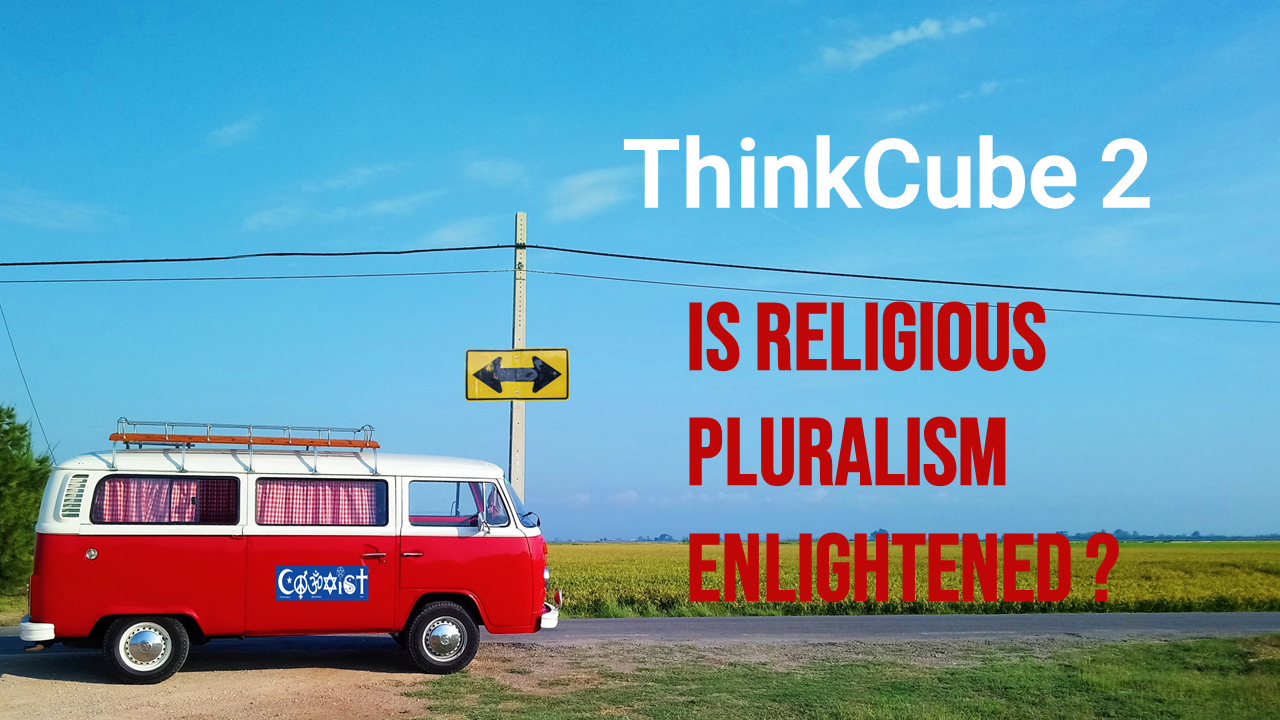
Premise 1 : Is religious pluralism enlightened?
Merriam Webster Dictionary defines “enlightened” as freed from ignorance and misinformation.
Is the belief that all religious paths lead to the same God more enlightened or educated? Comparatively, each religion teaches very different things about who God is and how humans reach the divine. In fact, there is a lot of disagreement between the religions regarding the nature of God.
The major world religions not only teach different things about who God is but also how we “reach him.” Just a few examples: Buddhism suggests the 8-fold Noble Path, Islam the 5 Pillars (Shahadah, Prayer, Fasting, Charity, Pilgrimage) and Christianity the gospel of Jesus.
Stephen Prothero, professor of Religion at Boston University, author of the New York Times bestseller Religious Literacy has appeared on CNN, MSNBC, The Oprah Winfrey Show, and The Colbert Report. In his book God Is Not One states that just as all religions are not one, God is not one.
It is comforting to pretend that the great religions make up one big, happy family. But this sentiment, however well-intentioned, is neither accurate or ethically possible
Stephen Prothero; Professor of Religion, Boston University. Author of New York Times Bestseller “Religious Literacy”
Prothero, who is both an expert on world religions and a former consultant on American Religious history at the Smithsonian National Museum has stated plainly in multiple books that based on careful analysis of what differing religions teach about the nature of God and how to reach him, religious pluralism must be reconsidered.
Discussion Question 1 : How or on what basis is it enlightened to tell people and cultures that have spent years studying and practicing their doctrinally distinct religions that their distinctions don’t matter?
Premise 2 : Is religious pluralism more tolerant and humble?
The differences in the world’s major religions is well documented, yet religious pluralists continue to insist that there are many ways to God. Obvious differences concerning core doctrines such as; the nature of God, or how humans access God, the reality of eternity are blatant and obvious, yet many well meaning and educated people persist in an inaccurate view of other religions. Why might this be ?
One of the primary reasons is because many believe it to be humble and loving. Some think that it is wrong to judge someone else’s religion and to tell them that they are wrong. By implication, they think that Christians who claim faith in Jesus Christ is the only way to God is an arrogant and close minded truth claim. But on close inspection, is calling people that have sincerely researched religions, compared their doctrines, and have come to their own personal conclusion that personal faith in Christ is true arrogant as humble and tolerant as it pretends to be.
in·tol·er·ant
/ˌinˈtäl(ə)rənt/
not tolerant of views, beliefs, or behavior that differ from one’s own.
Oxford Dictionary
Religious pluralist insist on their own version of truth “that all major religions contain the path to God” even though those religions deny that themselves.
The claim that all paths lead to the same God actually minimizes other religions by asserting a new religious claim. When someone says all paths lead to the same God, they blunt the distinctions between religions, throwing them all in one pot, saying: “See, they all get us to God so the differences don’t really matter.” This isn’t tolerance; it’s a power play
Jonathan Dodson, Masters Divinity Gordon-Conwell Seminary, The Gospel Project February 10,1921
Discussion Question 2: Is it truly tolerant or humble to insist that all religions lead to God, when the founders, and leaders of those religions say that is not true. Isn’t insisting that this view of religion is correct, and all others that deny it are wrong the definition of intolerant?
Premise 3 : The statement “All paths lead to the same God” is a faith concept
The claim that all paths lead to the same God actually minimizes other religions by asserting a new religious claim. The world’s main religions contain chiefly 3 main components:
- Who or what God is
- How or why you should live concerning salvation of your soul
- What heaven is or how you get there
Faith in the unity of religions is just that—faith
The claim or “pseudo doctrine” of all ways lead to God whether it intends to or not answers these questions in the definitive:
- Who or what God is- Whatever you want him to be will lead to same outcome
- How or why you should live-However you want will lead to same outcome
- What is heaven and how to get there-Doesn’t matter, just take your pick
The claim that “all ways lead to God” contains the elements that make up a major belief system
- Exclusive Truth Claim
- Doctrine
- Faith in the exclusive truth claim and doctrine
Discussion Question 3: Is claiming exclusively that “all ways lead to God” a leap of faith?
Have I considered the issue carefully, honestly, and with an open mind?
Does what I think conform to the rules of logic and avoid contradiction?
Is what I believe influenced by my own bias, presuppositions, or personal desires?
